 Thyroid goiter
Thyroid goiter
I am writing this on the way back from our three days in the villages around Jinja doing medical clinics. I feel sympathetic to the poor New Orleans dikes that had to hold back the waves of Hurricane Katrina. The villagers flooded the clinics. It was a wonderful experience to see patients on my own, to learn to diagnose with only a history and physical, and to get better at intercultural interviewing. However, I was also overwhelmed, even to tears, at the pressure to treat correctly with a limited and confusing history, no lab, and in too much of a frenzy to get a complete consult from another doctor esp. since I'm still a student. For example, in my first hour a woman I saw complained of "fever in her stomach". With the help of a translator I found out it had been there for more than a week. The rest of the details are a blur to me now. I remember her shaking and moaning when I touched her stomach. Her BP was high, and when I wanted to auscultate her lungs, she could not breathe deep enough because of the pain. Was it PID? Pylonephritis? Ruptured ectopic pregnancy? Appendicitis? Diverticulitis? .....??? All I could do was a urine dip. I told her to get to a hospital in case it was serious. We made arrangements with the family. I felt safe giving this advice until I talked to Ellen. She said the hospitals sometimes don't even have medicine needed and the doctors are poorly trained. We sent her with a course of Cipro in case the hospital had nothing better. I felt sick myself, but the line was backed up, so I helplessly continued. I remembered my frustration when our ill students in Kenya would come back from the clinic with a shotty diagnosis and only painkillers. I was afraid to become the same, but with limited supplies, time, and technology I felt helpless. Helpless:again, a step closer to how one must feel in this village overlooked by the corrupt government and without the education to be empowered with knowledge.
On the busiest day, in the village plagued with malaria, the three doctors and I saw almost 400 patients. This is not a bragging right. It is a horrible way to do medicine, but my only condolence is that is more than they will usually get, which is next to nothing. We treated many children with malaria; we treated pneumonia, gave iron and folate to pregnant women, as much education as possible, H2 blockers for "ulcers" (GERD), painkillers to old men stiff from years of hard work, cream for yeast infections ect.

My translator was a 19 year old girl who is in university in Kenya at Baraton. This is 30 km from Mariann school! She knew of my school and all the Kenyan dishes I'd enjoyed. We got along really well and even more so after figuring out all we had in common. I got to do health education for her, and she was great at relating it to the patients.
As we were preparing to leave the final day, I saw a mother and her sick child. I think I gave the mother medicine for her allergic rhinitis. Her boy was less than a year old, tachypnenic, and looked like he was sleeping. She told me that he was suffering fever, blood in the stools and blood in the urine. I asked a few questions and felt over my head. I told her to wait as I asked the other doctors to take care of it. We ended up gathering some money and sending him to the hospital. The conjunctiva of his eye was white. Dr. Hall, who worked here for six years, explained to me later that this is a common presentation for dying children in the area. Children and pregnant women are already low on iron as their blood supplies are pressed to keep up the body. Meat is the main source of iron, and it is in low supply in the village. Also many take tea, which has phytates that bind iron in the intestine so it is not absorbed. Worms steal blood as they suck the intestines, and they are common in Africa. With one bout of malaria which bursts red blood cells a child is thrust into an anemic state. They increase their breathing to get the oxygen they need, but with so few red blood cells it is almost futile. Without enough oxygen to the brain they slip into a coma. Dr. Hall guessed our little patient had a hemoglobin of 3 or less. He needed a blood transfusion, and Dr. Hall guessed that he had a 50/50 chance of living based on his condition and the probability of the hospital having a blood supply. I asked him about the blood in the urine and stool. He assumed it was Disseminated Intravascular Coaggulation. The strain of malaria named Falciparum (95% of what's found here) causes the red blood cells to be bumpy and stick. This causes clotting, and the DIC could have resulted from that and spilled blood into the urine and stool.
The last we heard he'd been accepted at the hospital, recieved blood, and was beginning malaria treatments.





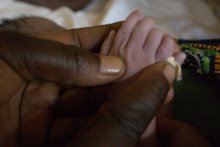

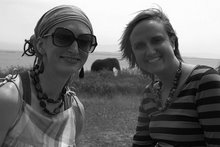
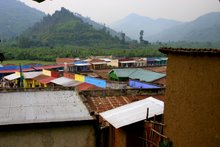
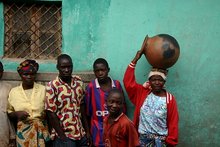
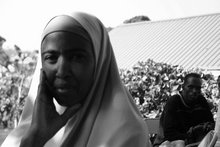
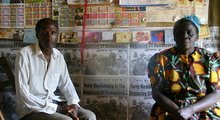
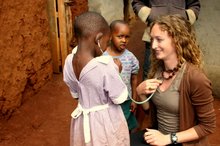
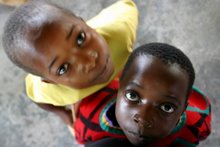
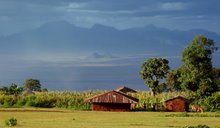
4 comments:
Hi Erika! Your dad shared your blog address with me and I'm so thrilled to be able to read your stories! I just love you so much for being such a servant for the Kingdom. Many many prayers for you and those you meet and those you work with!!
Erika,
Your Mom sent me this site. Your stories are amazing! Thanks for taking the time to take photos and to record your cases and your thoughts. I am incredibly proud of you!!!
Love,
Angie Hyche
hey nice pic. im glad i have a picture to document my traveling shirt that has made it all the way to africa. we should start the sisterhood of the traveling shirt series lol. love ya erika. miss ya "sissy poo". jon has some pretty funny stories from his trip to ABQ minus you that he should probably tell you about i laughed for probably 20 minutes. you will too.
Erika, remember when you feel you are not able to make a difference that you are a precense for good in a world that sees the USA as invadors and destroyers. Annie
Post a Comment